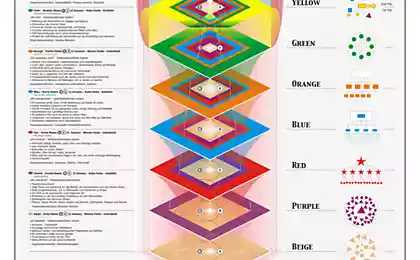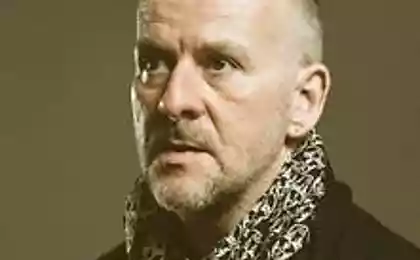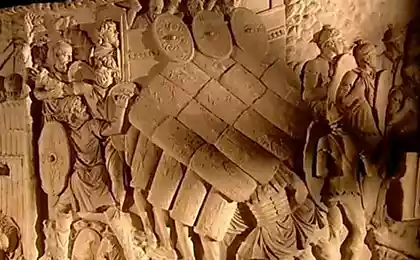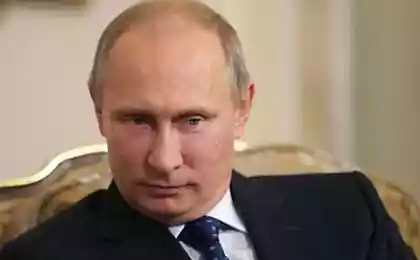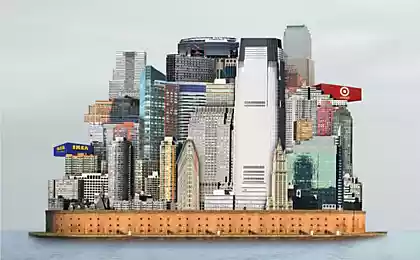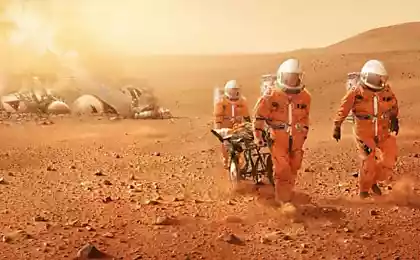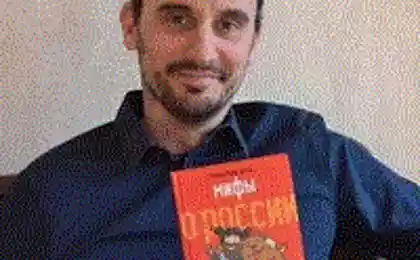587
Alastair Bonnette on political geography of the future
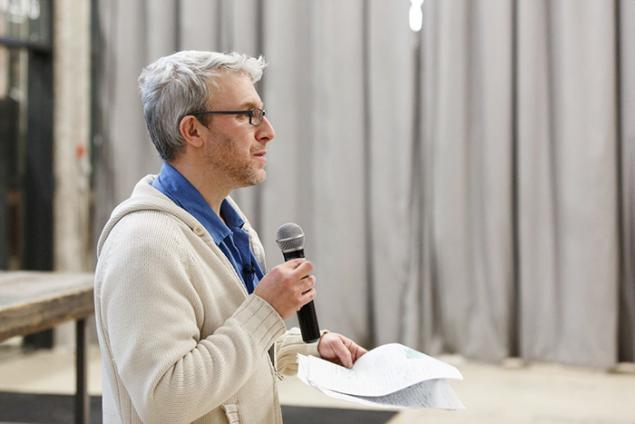
© InLiberty.ru
Professor of social geography, University of Newcastle and the author of seven books about new geography last year performed in Moscow and St. Petersburg in the framework of joint lectures Esquire and InLiberty. T&P talk to the Professor about the advantages and disadvantages of micro-States, city-States, growing nationalism, and how the map will look the world tomorrow. — Do you think that the processes that we can observe, for example, in Scotland and Spain, are global in nature? Does this mean that the era of large States in the past?
— Fragmentation of large States is only one of ways of formation of small States. The collapse of the Soviet Union, in my opinion, is the most important example of this phenomenon. At the same time there is another process that I would call the development of Micronesia local community and even individual families want to be independent. They are dissatisfied with the bureaucracy, they don't like being managed and operated large state. As a result, there are new experimental countries. Both of these processes make me think that the big powers will not necessarily rule the world in the twenty-first century. Even if you look at the example of the European Union, where there are large States and small, you can see clear signs of fragmentation of larger States, in this case Spain and Britain appear as key examples. The current territorial boundaries do not bring the people of Catalonia and Scotland's happiness, and they will always vote for independence. And this is just the tip of the iceberg.
Video lectures of Alistair Bonnett "Micro-and Micronesia"
— When, in your opinion, did this process of fragmentation? What started this process?
Worldwide, these processes occurred differently. Such a huge macrohistorical, as the Soviet Union was always difficult to maintain territorial integrity, to keep all countries together. The same we can see in the smaller countries — Spain, Italy is becoming increasingly difficult to keep the boundaries of a single state. In Africa we see many countries that were created as a result of colonization, and their boundaries were defined outer will, you might say, cruelty. Many States in Africa could break into smaller countries, if not violent centralized authority. Colonial power in Africa, and to a certain extent, and in Asia — has created an artificial state. In parallel, in Europe there is an increased request for political expression and the growing dissatisfaction with big government. In the former Soviet Union, the process of disintegration. So around the world we can see different dynamics of the fragmentation process associated to the different degree of control, reaction and violence of the state.
— Well, then it would be logical to ask the following question would be: whether any large state with something artificial?
By and large, all States are artificial. But this does not negate the fact that the process of fragmentation can be dangerous. I'm not romantizing this process and don't think its the result we will get a new perfect state. If African — any other, even European, is a multiethnic, multicultural country will fall apart into a mono-national state, this will be a dangerous process. In Africa, you may receive thousands of countries, configured antagonistic against each other. I don't think the world needs another nation-state, and they are beginning to play a lesser role in the twenty-first century. It is very important to determine what the process will entail the creation of small democratic States and which will lead to dangerous consequences.
— Can we assume the trend to fragmentation, which we are now speaking, a sign that the world is becoming more healthy and democratic?
— I think that globalization and the Internet allowed people to take control over their own lives, to establish direct relationships with their government. This was possible thanks to information — and it seems to me a great achievement. Many students from China who study at my University, I also want to live in a democratic time, democratic future. If the entire middle class in China shares these beliefs, that power will be unstoppable — and then the country can expect a big change that I will be interesting to watch.
But do not you think that these freedom-loving sentiments are associated exclusively with economic prosperity? The crisis of 2008, for example, diminished enthusiasm among residents of Catalonia.
— Yes, it is an indisputable fact — a small state in Europe, Africa and around the world often want to be independent because they think that because they are richer. Sometimes this opinion is true only in the short term — in a year they can be rich, the next poor. Therefore there is an objective reason why poor regions want to remain part of larger States on their contents. But this process does not necessarily need to consider one-sided: the EU is a wonderful example. Examples of such States in the world, we have neither American Union nor the African. The European Union has its problems, but it works. And it works because it is composed of independent States, which can be small or large — but they are all connected to each other (although there are exceptions like Catalonia), and rich regions help the poor. So that you can have both — support for the region and independence at the same time, thanks to a regime like the Confederacy. Currently, the concept of Confederation is in crisis, but, in my view, the Confederation may be the only solution for small countries. Otherwise, rich countries will get ahead, the poor lagged far behind, and the world will many conflicts, especially in the ethnic States which have become independent because of ethnic considerations. In this case we have a catastrophe.
I stress again: I'm not a romantic and not trying to play the role of prophet, I do not predict that the world will fall apart into a million of independent States. It would be a utopia. I describe what is happening now, and try to predict the optimal solution for the present time.— Speaking of utopias. Do you have a favorite utopia?
— I really like the images of utopia, where mankind and nature coexist in reasonable balance. The Green party in the UK has a long history — remember the ideas of William Morris? He talked about the decline of urban London and promised that it will capture the parks, greenery and nature. Not that he was an enemy of mankind and urbanization, he just dreamed about a more reasonable balance, the harmonious coexistence of man and the environment. These ideas inspire me.
In urban planning today are all talking about the fact that cities in the future will be a full-fledged state, there is concentrated Economics, politics, and the best shots. You can imagine such a scenario?
— Yes, on world talk a lot — to the point that they move to self-government, will become an independent state. It is impossible to deny such a possibility — we see how they begin to act more independently, less take into account the regions where they live. The mayors and citizens of cities are becoming more powerful. And I can imagine in the future they will talk with each other, forgetting about presidents and Prime Ministers. But I'd like to see city do not forget about the regions and understand that with all the food that they consume, and with all the resources that they use, they behave quite parasitic in relation to their country, their region. London is full of creative spaces, machinery — but there is not absolutely nothing is done, it's a real city-a parasite! But cities perceive themselves, of course not — they think they are kings of the world. People imagine a world where cities still remain, and the traditional government fails. But I don't think it will be effective, in the end, the government may say that they will cease to feed the city if they will not obey the shared policy.
— Where the criterion for the micro? How to separate the caricature, decorative microvascularity from the real thing? The same Vatican, for example, plays an extremely political significance.
— The Vatican has only three hundred inhabitants, but it is still a state. The largest of the microstates has a population of nine thousand people, as many people live in one small district of Moscow. Futbolisty stadium, even half a football stadium could be a state, if there are enough people who wants it. If they are found to be, for example, other football stadiums as a state, it will be quite another matter. A formal feature of the state is recognized. Micronesia can imitate the world around them, to imitate him, is to deliberately acknowledge each other. Such recognition seem to be artificial, then what distinguishes the present state of the experimental? The way you get the recognition and the validity of this recognition is whether it is normal, authentic. To move from one category to another and to get authentic recognition is not as difficult in the XXI century micro can jump to this level if they wish. And can continue to live in the shadow world of informal States. I suppose that many will live in both worlds — formal and informal, can have both micro - and macronational identity and constantly move from one world to another.
— In an interview with Esquire magazine, you said that individual US States are starting from time to time to talk about the separation — it can happen?
— Many States in the US a long time ago could be independent if they wanted to. Only one CA would be rather influential country would have entered the top 10 in terms of GDP, if it chose independence. Why is this not happening? Unlike Europe or Africa, in America, there is simply no historically formed identity.
All of these processes can affect global politics?
— They do not necessarily lead to the fact that the world is more left - or proforientational, capitalist or socialist. New processes could include all streams or to include any of them. I hope that as a result of these changes, the residents of small States have more opportunities to participate in political processes, link them with community discussions. And political differences between the parties will become more blurred, there will be others, no less influential parties, such as those associated with the struggle for the environment.
— This will be the next question. In the past the world was more simple and straightforward — with large States and their zones of influence. Do not complicate things, we are talking about, the political system so that it will be difficult to predict new developments?
— Yes, it is possible that new political and postpolitical system will develop. The division into left and right appeals to the ideas of the eighteenth century, the ideas of the French revolution, and since that time has undergone considerable evolution, which has not yet reflected to the end. Formed other political forces — nationalism, the movement of "green" and so on. Social movements, influencing policy, so many that to list them all would be simply impossible. Another example — feminism, the role of women in the political process. Many Micronesia and small States show us an example of a more healthy balance between women and men in politics. Can occur even feminist microvascularity. The need to talk about it shows how familiar to our situation with the predominance of men in politics, although in fact, this situation is inefficient and old-fashioned.
One of the driving forces and the main danger of fragmentation — nationalism. How to avoid it?— There should be a system that would restrict the activities of such extremist States, exploiting national identity, and would not allow them to flourish. I have no ready solution — but I understand that it is necessary both to preserve the autonomy and international cooperation. Probably the perfect solution and never will be — some things, such as the Islamic state of Iraq and the Levant, it is difficult to predict. 50 years ago people could not imagine what the world will be a nationalist force on this scale, and the system of international cooperation has not been established based on such cruelty, so currently she is unable to cope with it. Paradoxically, such cruelty is pushing the international organization to even greater cruelty.
Theoretically the US could have predicted it, but the emergence of ISIS was not the only scenario. What happens in an Islamic state, there are several reasons. On the one hand is the chaos that has engulfed the middle East and the Islamic world, caused by including the interference from external forces. On the other hand, we can observe an intellectual movement that has deep enough roots. So what is happening is the result not just of external interference, but also their own processes. In the light of globalization, this phenomenon becomes even more dangerous — and the nation-state becomes even more active.
— To summarize our conversation, I will ask you how the map will look the world through, say, twenty years?
— I wonder if our world will become more fragmented. It seems to me that Africa and China will remain in place, but it would be very difficult to preserve the unity of the territory. I can predict that in Europe — such as Spain — will be a independent site. As for Russia, it's hard to predict anything — in your country, these processes are unpredictable.
— Could not agree more. Do you think that wars will be more?
— A couple of years ago I would have said as a trend that wars are becoming less and less. But the power of the Islamic States, their ability to create protogosudarstva was a devastating point. In the world there are many other unresolved conflicts in India, Pakistan and China. However, you need to understand that people not become more violent. Steven Pinker wrote a book about it. The value wars will grow, perhaps, but actual reality will remain the same — and may be even a little less. We will become less tolerant of wars. At least I hope so. Today, when we are discussing war, it is increasingly seen as a political and state failure.
— After you've gone small States did not want to establish their own?
Paperwork, unfortunately, leaves me with no time for this. But I could be a great king (laughs).
Source: theoryandpractice.ru




